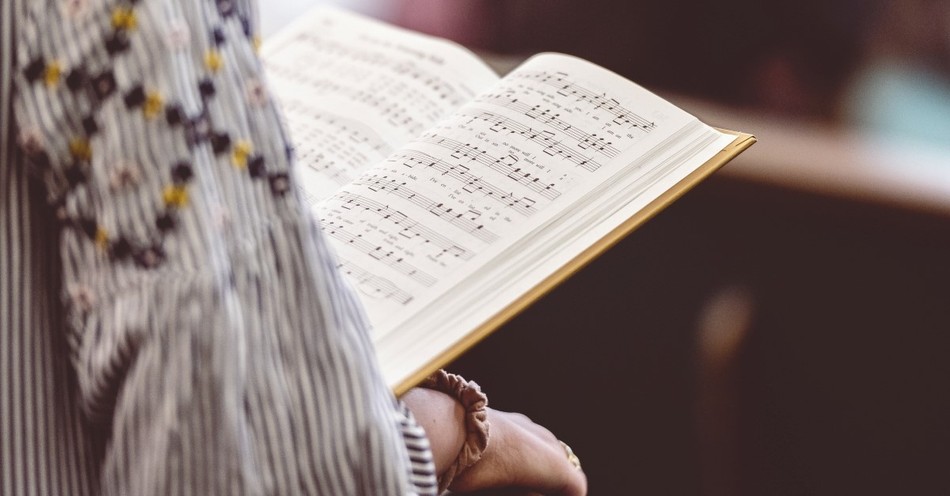I arrived home after work and noticed masking tape on the piano keys. The high school girl who walked my kids home from school applied the tape to teach my daughter to play the opening melody of “Joy to the World.”
For obvious reasons, my daughter’s performance of the song is my favorite, but it is always fascinating to see how people approach the song. Performances range from the choir-style recording here to Pentatonix’s acapella recording here to the minimal folk version below. The carol is the most published Christmas carol since the beginning of the 20th century. But is this song really about Christmas?
Who Wrote the Hymn “Joy to the World”?
Isaac Watts, called the Father of English hymns, wrote the lyrics to the hymn “Joy to the World” and printed it in his 1719 anthology, The Psalms of David.
In his lyrics, Watts adapted the language of the Bible to make the psalmist speak “the language of a Christian.” Examples of Watts’ accessible Psalms paraphrases can be heard in his hymns “O God, Our Help in Ages Past,” based on Psalm 90, and “Joy to the World,” based on Psalm 98.
Isaac Watts was born July 27, 1674, in Southampton, England, the oldest child in a family led by a father who was a dissenter from the Church of England. Isaac was a bright, scholarly child. He learned classical languages from the age of four and rhymed in conversation. Isaac studied formally in an academy of independent Christians and then on his own, delving into the Bible’s scripture, which inspired his lyrics for over 600 hymns.
The lyrics to “Joy to the World” arrived in America when Benjamin Franklin published it in 1729. Lowell Mason, a well-respected composer and music editor, wrote the tune of “Joy to the World” that carolers use today. Mason published an early arrangement of “Joy to the World” in his anthology The Modern Psalmist in 1839 and named the tune “Antioch.”
Lowell Mason pieced together some of the melodies in George Frederic Handel’s Messiah to write “Joy to the World.” Handel scholars note that the first four notes of “Joy to the World” are the same as the first four notes in the chorus “Lift Up Your Heads” from Handel’s Messiah. The rousing “heaven and nature sing” melody imitates an instrumental and tenor section of “Comfort Ye,” another piece of the Messiah.
What Are the Lyrics to “Joy to the World”?
“Joy to the World” has four stanzas. The third verse is occasionally omitted.
Joy to the world! the Lord is come;
Let earth receive her King;
Let every heart prepare him room,
And heaven and nature sing,
And heaven, and heaven, and nature sing.
Joy to the world! the Savior reigns;
Let men their songs employ;
While fields and floods, rocks, hills, and plains
Repeat the sounding joy,
Repeat, repeat the sounding joy
No more let sins and sorrows grow,
Nor thorns infest the ground;
He comes to make His blessings flow
Far as the curse is found,
Far as, far as, the curse is found.
He rules the world with truth and grace,
And makes the nations prove
The glories of His righteousness,
And wonders of His love,
And wonders, wonders, of His love.
Is “Joy to the World” Based on a Particular Bible Passage?
Watts was inspired by Psalm 98 and Genesis 3 when he wrote “Joy to the World.” Watts stated in The Psalms of David that “out of the 98th Psalm I have fully exprest (sic) what I esteem to be the first and chief Sense of the Holy Scriptures . . .”
Watts’ interpretation of Psalm 98:1-3 expresses how the world rejoices because of God’s faithfulness to the people of Israel: God has delivered salvation to His people through His son Jesus. Note that Psalm 1:3 reads, “He has remembered his love and his faithfulness to Israel; all the ends of the earth have seen the salvation of our God.”
The text of Psalms 98:4-8 expresses the joy of receiving salvation: “Make a joyful noise unto the Lord, all the earth: make a loud noise, and rejoice, and sing praise. . . . Let the sea roar, and the fullness thereof; the world, and they that dwell therein. Let the floods clap their hands: let the hills be joyful together.” This enthusiastic poetry is reflected in the second stanza of “Joy to the World.”
Psalms 98:9 has a serious tone: “. . . let them sing before the Lord/for he cometh to judge the earth/with righteousness shall he judge the world/and the people with equity.” These ideas are the basis for the lyrics of the fourth stanza of “Joy to the World.”
The third stanza of “Joy to the World” alludes to Genesis 3:17-19. It expresses Christ’s victory over the curse of sin that had plagued humans since the Garden of Eden. The “cheerful” repetition of the phrase “far as the curse is found” has caused this stanza to be omitted from some hymnals. The third verse is based on Watts’ New Testament understanding of Christ’s sacrifice.
Joy is a prevalent theme in the Bible. For example, we see it in Psalm 96, Psalm 150, Isaiah 55:12, and Nehemiah 8:10.
Has “Joy to the World” Always Been a Christmas Hymn?
Surprisingly, “Joy to the World” was not written as a Christmas carol. There is no mention of a virgin birth or angels heralding the coming of a Savior. Instead, the hymn appears to celebrate the second coming of Christ in all its glory.
Isaac Watts was working with Old Testament Psalms, which were written 500 to 1,000 years before the birth of Jesus; that is, the Psalms were not written in a Christmas carol setting. The song’s message goes beyond a virgin birth of a Savior. Watts understood Psalm 98:9 (“He will judge the world in righteousness and the peoples with equity”) to foretell the second coming of Christ, when He will judge and rule the world at the end of time. This message is clearly expressed in the fourth stanza:
He rules the world with truth and grace,
And makes the nations prove
The glories of His righteousness
The imagery emphasizes the Savior who comes as a great global leader rather than baby Jesus’ humble arrival on earth. This does not make it inappropriate for Christmas, though a little different than we expect at Christmastime.
One hundred and twenty-nine years after Watts wrote the hymn, Mason put a different spin on it with a new melody. Afterword, it became a Christmas classic.
What Does “Joy to the World” Teach Us about Jesus?
“Joy to the World” mainly expresses Christ as a king ruling nations and abounding in grace for people everywhere. The “fields and floods, rocks, hills, and plains” that “repeat the sounding joy,” however, may remind us of the New Testament Jesus, raised in rural Galilee and bringing joy to earth while He was preaching and healing in the open air and boats on the sea. The lines “Let every heart prepare Him room/And heaven and nature sing” celebrate a king with love rooted in His followers’ hearts and the physical world.
The hymn may not have been written for Christmas, but it fits the season, because there is joy unconfined in our celebration of Christmas. Christ comes to earth as a baby who changes humanity’s spiritual and social lives. His pregnant mother, Mary, envisions this new world order, joyfully expressed in her Magnificat song: “My soul doth magnify the Lord/And my spirit rejoices with Christ my Savior” (Luke 1:46). Israelites had waited fourteen generations for a Savior—from the time of God’s promises to Abraham until the arrival of Jesus. And four thousand years had passed since Adam and Eve fell from God’s grace in the Garden of Eden. Christmas was and is a time to celebrate, as the lyrics to “Joy to the World” state:
“The Lord is come./ Let heaven and earth rejoice.”
Photo Credit: © Getty Images/Wirestock

This article is part of our larger Christmas and Advent resource library centered around the events leading up to the birth of Jesus Christ. We hope these articles help you understand the meaning and story behind important Christian holidays and dates and encourage you as you take time to reflect on all that God has done for us through His Son, Jesus Christ!
What Is Christmas? It's History, Origin, and Traditions
The History and Origin of Santa Claus
Christmas Prayers and Blessings
The Beautiful Meaning and Purpose of Advent
Advent Prayers
Advent Wreath & Candles Meaning
The History and Meaning of the Advent Calendar




